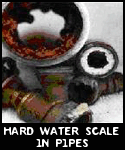Water hardness is one of the most common water problems facing homeowners today.
Hard water keeps soaps and detergents from getting laundry and dishes really clean, causing homeowners to spend more on extra soap and cleaning products. It also leaves telltale spots on glasses, shower doors and chrome fixtures causing homeowners to spend extra time on cleaning. Hard water scale can clog pipes and plumbing fixtures, causing premature failure of washing machines, hot water heaters and dishwashers. Hard water also dries skin, dulls hair and makes shaving difficult. Water hardness is caused by calcium or magnesium dissolved in water.When water falls to the ground as rain it is virtually free of hardness minerals and is naturally soft. In the old days people would store this naturally soft rainwater in barrels and use it to do laundry. Now with the advent of deep-water wells the rainwater has to work its way down through earthly minerals to reach the aquifer from which it is drawn. On its way down, water, the universal solvent, comes in contact with calcium and magnesium from rocks, usually limestone, gypsum and dolomite and becomes saturated with these minerals and changes from soft to hard water. Why is it called Hard Water?The term "hard water" originally came about because such water was "hard" for soaps to really get things clean.The calcium in hard water retards the cleaning action of soaps. The homeowner will use up to twice as much soap or detergents and use hotter water when cleaning with hard water than with soft water. Hard water also combines with soaps to form a curd known as "soap scum". This scum can remain as a residue on "cleaned" laundry. It can also be found as a white ring on tubs, tile and toilets. Hardened soap scum actually coats the fibers of the washed fabrics making them wear down as they rub against the hardened coating. Thus fabrics washed in hard water do wear out faster. Colors fade and whites darken faster in hard water wash. When hard water is heated the calcium comes out of solution and forms "hard water scale". This scale builds up in household appliances and shortens their life. Electric hot water heaters do not last long or operate efficiently as scale builds up on their elements and in their tanks. Washing machines and dishwashers also have shortened lives. This scale is evident as white spots on cleaned glasses, shower doors, coffeepots and the chrome surfaces of faucets and other fixtures. Plumbing pipes, fixtures, and shower heads over time will become clogged with hard water scale. The pipes become restricted and flow rates drop dramatically. Faucets need repairs more often due to scale clogging the inner workings. Hard water also hampers good grooming.The hardness minerals tend to dry the skin. Shampoos and soaps do not work efficiently in hard water leaving hair dull and dry. The undissolved soaps and shampoos actually leave a residue film on skin and hair. The film combines with shampoo or soap, trapping dirt and bacteria that can lead to chapping, itching, flaking skin and clogged pores. If you wash in hard water you are not truly getting clean. The remedy for all these hard water problems is the installation of a water softener. |
Service site for BelKraft International - BelKraft Canada - Carico All Rights Reserved